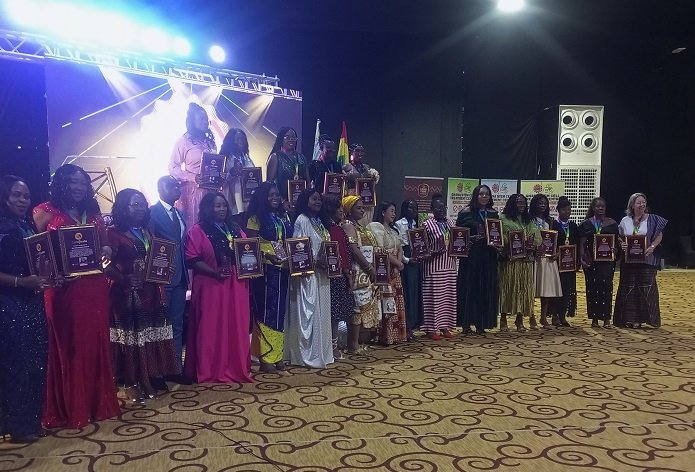News
40 women honoured at 11th Feminine Ghana Achievement Awards

The General Manager of HotJobs, Mrs Mimi Serwaa Mefful, has called on stakeholders across Ghana’s economic and policy sectors to take concrete action toward achieving gender equality in policy planning and national investment.
Speaking at the 11th Feminine Ghana Achievement Awards in Accra on Friday, Mrs Mefful described women as the ‘silent architects’ of Ghana’s economy – financing families, mentoring traders, and building businesses from the ground up, often without recognition.
Organised by The Business Executive, a PAN WEST African media, communications and events management company, the event was held under the theme “Resetting the role of women in socio-economic reboot”, and aimed to honour female leaders who have demonstrated excellence, innovation, and unwavering dedication to national development.
Despite women comprising more than 50 per cent of Ghana’s population, Mrs Mefful noted that they own less than 15 per cent of formal businesses. Most women, she said, are engaged in micro-and medium-scale enterprises, yet face significant barriers in accessing capital, markets, and digital infrastructure.
“Even in spaces where women are numerically present, they are often undermined when it comes to decision-making,” she stated. “And yet, brick by brick, city by city, child by child, women have built this nation.”
While acknowledging some progress, she stressed the need for a broader socio-economic transformation that positions women not merely as beneficiaries, but as co-creators of policy and opportunity.
The Head of Mission at the Diaspora African Forum, Dr. Erieka Bennet, also urged women in leadership to support others, emphasizing that real change comes through collective support not climbing alone.
Dr. Leslie Casely-Hayford, Director and Principal Consultant at Associates for Change, underscored the importance of women’s participation in both governance and the private sector, highlighting their pivotal role in nurturing families and shaping strong societies.
The Feminine Ghana Achievement Awards aim to publicly recognise Ghanaian women who have made remarkable contributions across diverse fields in both the public and private sectors including entrepreneurship, professional services, corporate leadership,
By Esinam Esinam Kuatsinu
News
Man sentenced to 25 years for robbery at Manso Akwasiso

A 30-year-old man has been sentenced to 25 years imprisonment with hard labour by the Bekwai Circuit Court for his role in a 2022 robbery at a mining site at Manso Akwasiso in the Ashanti South Region.
The convict, Dominic Ofori, also known as Fanta, was arrested on 16th February 2026 after years on the run. He pleaded guilty before the Bekwai Circuit Court to robbery contrary to Section 149 of the Criminal Offences Act, 1960 Act 29, and was accordingly sentenced to 25 years imprisonment with hard labour.
On March 20, 2022, the Manso Adubia District Police received intelligence that a group of armed men from Manso Abodom were planning to attack a mining site at Manso Akwasiso to rob the owner of gold concentrate. Acting on the information, police mounted a coordinated operation and laid an ambush at the site.
At about 5:30 pm the same day, four-armed men arrived at the site, fired indiscriminately, and robbed the miners of their gold concentrate. The police team on surveillance intervened, resulting in an exchange of gunfire.
Three of the suspects, Abu Abubakar, Musah Latif, and Gideon Takyi, sustained gunshot wounds and were pronounced dead on arrival at St Martins Catholic Hospital at Agroyesum. Dominic Ofori escaped at the time but was later arrested and put before the court.
The Ashanti South Regional Police Command has assured the public of its continued commitment to combating violent crimes and bringing offenders to justice.
News
Ashanti police arrest man for publishing false news on TikTok

The Ashanti Regional Police Command has arrested 45-year-old Isaac Boafo, also known as “Duabo King,” for allegedly publishing false news intended to cause fear and panic.
Police said the arrest follows a viral TikTok video in which Boafo claimed that four officers at the Central Police Station in Kumasi engaged in inappropriate conduct with commercial sex workers during night patrols in Asafo.
Officers from the Police Intelligence Directorate (Ashanti Region) apprehended Boafo after receiving intelligence about the video.
During questioning, he admitted to creating the video to attract views and engagement online, and acknowledged that he could not prove the allegations.
Boafo also admitted making comments about the President of the Republic for content purposes and could not defend those statements.
He has been formally charged and is in detention as investigations continue.
The Ashanti Regional Police have warned the public against publishing or sharing false information on social media, noting that such acts can cause fear, panic, and damage reputations.
They said anyone found engaging in similar conduct will face legal action.
By: Jacob Aggrey






